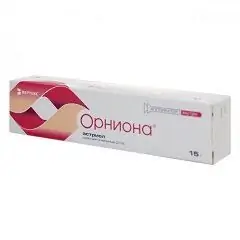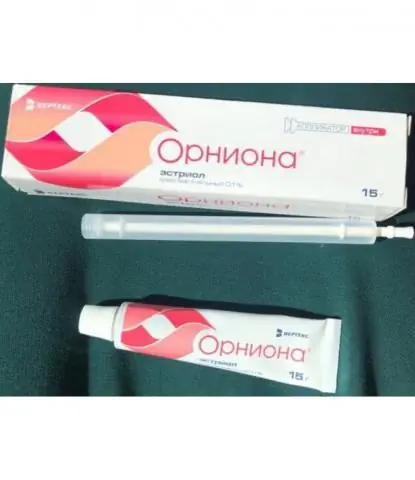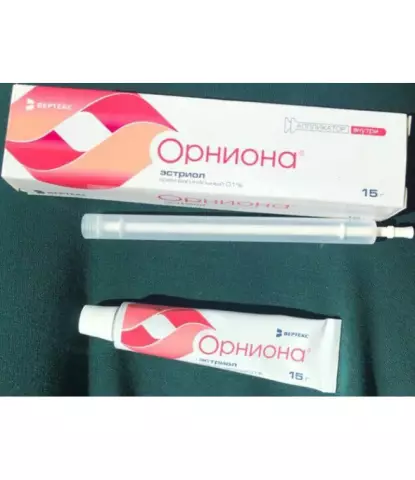- Author Rachel Wainwright wainwright@abchealthonline.com.
- Public 2023-12-15 07:39.
- Last modified 2025-11-02 20:14.
Ornion
Ornion: instructions for use and reviews
- 1. Release form and composition
- 2. Pharmacological properties
- 3. Indications for use
- 4. Contraindications
- 5. Method of application and dosage
- 6. Side effects
- 7. Overdose
- 8. Special instructions
- 9. Application during pregnancy and lactation
- 10. In case of impaired renal function
- 11. For violations of liver function
- 12. Drug interactions
- 13. Analogs
- 14. Terms and conditions of storage
- 15. Terms of dispensing from pharmacies
- 16. Reviews
- 17. Price in pharmacies
Latin name: Orniona
ATX code: G03CA04
Active ingredient: estriol (Estriol)
Manufacturer: CJSC VERTEX (Russia)
Description and photo update: 2018-27-11
Prices in pharmacies: from 759 rubles.
Buy

Orniona is an estrogenic drug, an analogue of the natural female hormone, which compensates for the estrogen deficiency during pre- and postmenopausal periods.
Release form and composition
The drug is produced in the form of a vaginal cream: almost white or white, homogeneous consistency, with a weak specific odor (15 or 30 g each in an aluminum tube, in a cardboard box 1 tube with an applicator and instructions for use Orniona).
1 g of cream contains:
- active substance: estriol - 1 mg;
- additional components: cetyl alcohol, glycerol (glycerin), ethanol 95% (ethyl alcohol 95%), stearyl alcohol, macrogol 25 cetostearyl ether, sorbitan stearate, cetyl palmitate, sodium hydroxide, chlorhexidine dihydrochloride (chlorhexidine acid), molar water.
Pharmacological properties
Pharmacodynamics
Ornion's vaginal cream contains estriol as an active ingredient, which is an analogue of a natural female hormone. The drug is used to correct the lack of estrogen in women during the pre- and postmenopausal period, in addition, it is effective in the treatment of urogenital pathologies. Estriol helps to eliminate atrophy of the epithelium of the cervix and vagina, normalize the microflora and physiological pH of the vagina, and, as a result, increases the resistance of the vaginal epithelium to infectious and inflammatory lesions. In contrast to other estrogens, it interacts with the nuclei of endometrial cells for a short period of time. This allows, provided that Orniona is used once a day in the recommended dose, to avoid endometrial proliferation. Due to this property of estriol, additional administration of progestogens in a cyclic mode is not required, and withdrawal bleeding does not occur in the postmenopausal period.
Pharmacokinetics
With intravaginal administration, the optimal local bioavailability of the active substance is noted. After absorption, the agent also enters the general bloodstream, which is manifested in a rapid increase in the level of unconjugated estriol in the blood plasma, the maximum concentration (C max) of the substance is observed 1-2 hours after application. Estriol, unlike other estrogens, in blood plasma is almost 90% bound to albumin, and not to sex hormone binding globulin (SHBG).
After the introduction of the active substance into the vagina at a dose of 0.5 mg, its C max in the blood plasma is approximately 100 pg / ml, and the C min is 25 pg / ml, the average concentration is approximately 70 pg / ml. After daily application of vaginal estriol at a dose of 0.5 mg for 3 weeks, the average concentration decreases to 40 pg / ml.
The metabolism of estriol in the body is limited to its conjugation and deconjugation under conditions of enterohepatic recirculation. Estriol is the end product of metabolism, therefore it is excreted mainly by the kidneys in conjugated form. Only a small portion (2%) of the substance is excreted in the feces, mainly in unconjugated form. The half-life can be 6-9 hours.
Indications for use
- pre- and postoperative therapy for women in the postmenopausal period who have already undergone or are recommended to undergo vaginal surgery;
- hormone replacement therapy (HRT) for the treatment of atrophy of the mucous membrane of the lower parts of the genitourinary tract, due to a lack of estrogen in postmenopausal women;
- diagnostics carried out against the background of unclear results of cytological examination of the cervical epithelium, in the presence of atrophic changes (as an aid).
Contraindications
Absolute:
- untreated endometrial hyperplasia;
- Established or suspected estrogen-dependent tumors (eg, endometrial cancer)
- bleeding from the vagina of unknown origin;
- Established, history, or suspected breast cancer
- an acute stage of liver disease or a history of liver damage, after which the indicators of its function did not return to normal;
- porphyria;
- thromboembolism and thrombosis (venous / arterial) currently and / or in history (including pulmonary embolism, deep vein thrombosis, stroke, myocardial infarction), cerebrovascular disorders;
- congenital or acquired tendency to develop arterial / venous thrombosis, including a lack of antithrombin III, protein C or protein S;
- angina pectoris, transient ischemic attacks and other conditions preceding thrombosis, currently or in history;
- pregnancy and lactation;
- hypersensitivity to any of the constituents of the drug.
Relative (for current or previously noted following conditions / diseases, or for their aggravation during previous pregnancies, or previous hormonal therapy, the patient must be under the supervision of a specialist; it should be borne in mind that these conditions / diseases may recur or worsen in period of Orniona's treatment):
- risk factors for the development of estrogen-dependent tumors (for example, I degree of heredity for breast cancer);
- endometriosis or leiomyoma (uterine fibroma);
- a history of endometrial hyperplasia;
- adenoma and other benign liver tumors;
- the presence of risk factors for thromboembolic disorders;
- arterial hypertension;
- cholelithiasis;
- pancreatitis;
- diabetes mellitus with or without angiopathy;
- systemic lupus erythematosus;
- migraine or headache;
- familial hyperlipoproteinemia;
- bronchial asthma;
- epilepsy;
- otosclerosis.
Ornion, instructions for use: method and dosage
The drug is used intravaginally.
Ornion cream is injected into the vagina once a day, at night before going to bed, using a calibrated applicator. One dose is placed in the applicator, filled to the annular mark, and is 0.5 g of the drug, which is equivalent to estriol in the amount of 0.5 mg.
Ornion can be used in the case of a previous hysterectomy, as well as in the presence of an intact uterus.
Recommended dosage regimen:
- pre- and postoperative therapy in postmenopausal women with surgery by vaginal access: before surgery - 1 injection daily for 14 days, after surgery - 1 injection 2 times a week for 14 days;
- HRT for the treatment of atrophy of the mucous membrane of the lower parts of the genitourinary tract caused by a lack of estrogen in postmenopausal women: 1 administration daily for no more than 14 days until the severity of symptoms decreases, then, taking into account the clinical picture, the dose is gradually reduced to a maintenance dose (for example, 1 administration twice in week);
- diagnostics in case of an uninformative response of cytological examination of the cervical epithelium and the presence of atrophic changes: 1 injection every other day for 7 days before taking the next smear.
If the next dose of the drug was accidentally missed, its use should be continued according to the usual scheme, avoiding the introduction of two doses in 1 day.
At the beginning of therapy for postmenopausal symptoms and during its continuation, it is necessary to use the drug for the shortest period of time in the lowest effective dose.
Patients who have not taken drugs intended for HRT, or who are switching from continuous treatment with oral combination drugs for HRT to using Orniona, can start using it any day. Patients who have previously taken oral medications for HRT in a cyclic mode should begin treatment with Orniona 1 week after discontinuation of these medications.
Before the first injection of the cream, unscrew the cap from the tube and turn it over, open the tube with a sharp tip. Having screwed the applicator onto the tube, it is required to squeeze it so as to fill the applicator with cream until the piston stops, then remove the applicator from the tube and close it with a cap. In the supine position, insert the applicator filled with cream deep into the vagina and gently push the plunger to push out the entire contents of the applicator. After completing the procedure, it is required to remove the piston from the body and wash all parts of the applicator in warm water and soap. For this purpose, you must not use synthetic detergents, and the applicator must not be placed in hot water or boiling water. After washing, it should be rinsed with warm clean boiled water.
Side effects
The use of Orniona, like any other agent applied to the mucous membrane, can lead to local irritation or itching. During treatment, it is possible to develop acyclic bleeding, breakthrough bleeding, metrorrhagia. In rare cases, there may be tension, tenderness, tenderness, or enlargement of the mammary glands. These adverse reactions usually disappear after the first weeks of the course. It should be borne in mind that they may indicate the use of too large a dose of Orniona.
There are also reports of other disorders that have arisen against the background of estrogen monotherapy or combined treatment with progestogens and estrogens:
- genitals and mammary gland: increased libido;
- liver and biliary tract: cholelithiasis;
- digestive tract: nausea;
- skin and subcutaneous tissues: chloasma, hemorrhagic purpura, erythema nodosum, erythema multiforme;
- benign / malignant / unspecified neoplasms (including polyps and cysts): benign and malignant estrogen-dependent neoplasias, including endometrial cancer, cervical cancer;
- water-electrolyte exchange: fluid retention;
- mental disorders: dementia at the beginning of HRT in continuous mode in patients over 65 years of age.
According to existing data, during the treatment period there is a risk of ovarian cancer, breast cancer, the risk of venous thromboembolism (VTE), coronary heart disease (CHD), ischemic stroke.
Overdose
Against the background of intravaginal administration of Ornion cream, the probability of an overdose is unlikely. In case of accidental oral administration of the cream, headache, vaginal bleeding, vomiting, and nausea may occur. Treatment in this case, if necessary, is symptomatic. There is no specific antidote.
special instructions
Disorders of urination (mild urinary incontinence, dysuria, increased frequency of urination) and discomfort in the vagina (itching, dryness of the vaginal mucosa, pain during intercourse) can be manifestations of atrophy of the mucous membrane of the lower urinary and genital tract, associated with a lack of estrogen.
It is necessary to start HRT for the treatment of postmenopausal symptoms only in the presence of such disorders that adversely affect the quality of life. In any case, it is necessary to carefully assess the risks and benefits of treatment at least once a year. Continue HRT only during the period of time when the benefits outweigh the risks.
Before starting or resuming HRT, it is necessary to collect a detailed individual as well as a family history. Guided by the history data, warnings and contraindications for the use of the drug, a clinical examination should be carried out, which should include an examination of the mammary glands and pelvic organs. During the use of Orniona, it is recommended to periodically (at least once a year) carry out general medical examinations, gynecological examinations, including examination of the mammary glands.
It is necessary to discontinue treatment if contraindications are found and / or when the following conditions appear:
- occurrence / renewal of migraine-type headache;
- marked increase in blood pressure;
- deterioration of the liver and / or jaundice;
- pregnancy.
In order to prevent stimulation of the endometrium, Ornion should be used in a daily dose not exceeding 0.5 mg of estriol (1 administration) for no more than 4 consecutive weeks with daily administration. If vaginal bleeding develops, you should immediately consult your doctor.
It is known that HRT can lead to an increase in mammographic density, which complicates the radiological diagnosis of breast cancer. With estriol treatment, according to clinical studies, the risk of an increase in mammographic density is lower than with other estrogens. The threat of breast cancer is exacerbated by combined treatment with estrogens and progestogens, and, to a much lesser extent, by estrogen monotherapy. The level of risk is related to the duration of HRT.
Long-term treatment (5-10 years) with estrogen-only drugs may be associated with a slightly increased risk of ovarian cancer. There are no data that would indicate the same risk of developing this complication with prolonged use of low-dose estrogens (including Orniona) and with monotherapy with other estrogens.
Against the background of HRT, the threat of VTE increases by 1.3-3 times. The development of the disease is most likely during the first year of therapy than at a later date. Whether the use of Orniona is associated with the same threat is unknown.
Risk factors for VTE include: old age, estrogen intake, major surgery, obesity (body mass index above 30 kg / m²), prolonged immobilization, cancer, systemic lupus erythematosus, pregnancy / puerperium. After any surgical intervention, prophylaxis of VTE should be carried out. In the case when prolonged immobilization is due to elective surgery, HRT should be temporarily canceled 4-6 weeks prior to surgical treatment. It is recommended to resume the course after the patient starts walking.
If, after starting to use Orniona, the development of possible symptoms of thromboembolism (shortness of breath, sudden chest pain, painful swelling of the leg) is observed, it is necessary to discontinue treatment with the drug and immediately consult a doctor.
Against the background of HRT, in the presence of initial hypertriglyceridemia, an increase in the plasma level of triglycerides in the blood is possible, which can cause pancreatitis.
With the development of vaginal infections, concomitant specific treatment is recommended.
Estriol is a weak gonadotropin inhibitor and does not exhibit any other significant effect on the endocrine system.
Orniona contains stearyl and cetyl alcohol, which can cause local skin reactions, including contact dermatitis.
Influence on the ability to drive vehicles and complex mechanisms
Orniona does not have any effect on the ability to drive vehicles and other complex mechanisms.
Application during pregnancy and lactation
Orniona is intended for use in postmenopausal women. When pregnancy occurs or if pregnancy is suspected, as well as during breastfeeding, the use of the drug is contraindicated.
With impaired renal function
Since estrogens can provoke fluid retention, patients with impaired renal function and cardiovascular failure require careful monitoring.
For violations of liver function
Ornion is contraindicated to use in the presence of liver disease in the acute stage or indications in the history of liver damage, after which the indicators of its function did not return to normal. Patients with benign liver tumors need to use the drug with extreme caution and under medical supervision.
Drug interactions
- herbal remedies including St. John's wort (Hypericum perforatum); compounds that induce enzymes that are involved in the metabolism of drugs (mainly cytochrome P450 enzymes), such as phenytoin, phenobarbital, carbamazepine (anticonvulsants), nevirapine, rifabutin, rifampicin, nelfinavir, ritonavir, efavirenz (antimicrobial agents) (antimicrobial agents): the metabolism of estrogens may increase and their clinical effect may decrease;
- ethanol, anxiolytics, narcotic analgesics, drugs for general anesthesia, some antihypertensive drugs: reduce the effectiveness of estriol;
- lipid-lowering drugs: the effect of these drugs is enhanced;
- male sex hormones, antidepressants, anticoagulants, hypoglycemic, antihypertensive and diuretic drugs: their effectiveness is weakened;
- thyroid drugs, folic acid: the estrogenic effect of estriol increases;
- glucocorticosteroids: it is possible to enhance their pharmacological action;
- oleandomycin, theophylline, suxamethonium: there may be an increase in the activity of these funds.
Interaction between topical preparations containing estriol and other drugs in clinical practice has not been recorded.
Analogs
Orniona's analogues are Ovestin, Estrovagin, Ovipol Clio, Estrokad, Estrogel, Divigel, Klimara, Gynoflor, Trioginal, etc.
Terms and conditions of storage
Keep out of the reach of children at a temperature not exceeding 25 ° C.
Shelf life is 2 years.
Terms of dispensing from pharmacies
Available without a prescription.
Reviews about Ornion
Reviews of Ornion on medical websites are mostly positive. Patients note a good result of drug treatment with a lack of estrogen during pre- and postmenopausal periods. The use of the cream strictly according to the indications, observing the recommended dosage, helps to eliminate the undesirable phenomena that arise during these periods, relieves unpleasant local symptoms, normalizes the vaginal microflora, having a beneficial effect on the urogenital tract, does not lead to the development of systemic effects, does not cause withdrawal bleeding. Women also point out that Ornion is as effective as its expensive imported counterparts.
The disadvantages of vaginal cream include a large number of contraindications to its use. There are no complaints about the occurrence of undesirable reactions.
Orniona price in pharmacies
The price of Orniona (vaginal cream 0.1%) can be 610-690 rubles per tube containing 15 g.
Orniona: prices in online pharmacies
|
Drug name Price Pharmacy |
|
Orniona 0.1% vaginal cream 15 g 1 pc. 759 r Buy |

Maria Kulkes Medical journalist About the author
Education: First Moscow State Medical University named after I. M. Sechenov, specialty "General Medicine".
Information about the drug is generalized, provided for informational purposes only and does not replace the official instructions. Self-medication is hazardous to health!






